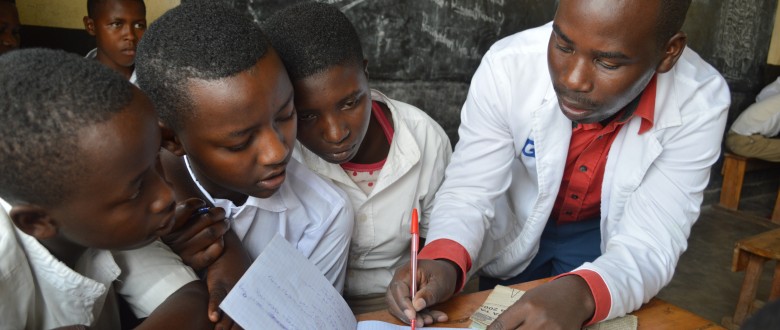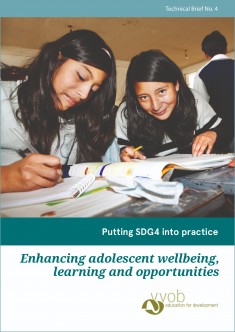
This blog was originally published on UNESCO's IIEP Learning Portal on the occasion of International Youth Day (12 August).
Rwanda’s population is young and growing. Every year, an estimated 220,000 adolescents enter the labour market. Aspiring to decent work and earnings, many youth – especially girls – are held back by the slow growth of jobs in the formal sector, but also by their own inadequate training. Transforming education helps pave the way to meet adolescents’ aspirations and equip them for the future of work.
The theme of this year’s International Youth Day being ‘Transforming Education’, VVOB seizes the occasion to share its experiences in transforming STEM education in Rwanda. By turning it into a powerful tool for young people, boys and girls, their opportunities to secure decent and fulfilling work in a rapidly shifting economy increase.
A vision for STEM
Rwanda has formulated a policy framework to become a Middle-Income Country (MIC) by 2020; Vision 2020. Traditionally a subsistence-based agricultural economy, the framework outlines Rwanda’s strategies to shift towards a knowledge-based, ICT-led society. Among those strategies, developing a strong base of science, technology and innovation graduates is spearheaded.
Yet, a minority of secondary school graduates choose a STEM-related field of study, in part because it is socially perceived to be too difficult or primarily for men. What is more, many adolescents lack solid foundational STEM skills. Measures are needed to improve STEM education at upper primary and secondary level and to prepare Rwanda’s 2,606,000 adolescents (10 to 19 yrs. old) for the future of work.

Current learning deficits can be offset by investing in innovative and relevant teacher training and capacity building. What is more, the introduction of gender-responsive pedagogies empowers adolescent girls to choose, and successfully complete, a study in STEM.
Investing in teachers = investing in learning outcomes
Controlling for the home environment, the quality of teaching is the single most determinant factor of learning outcomes. Yet, many teachers in Rwanda lack the necessary content knowledge and skills, particularly in the field of STEM, to provide quality teaching for all.
To help tackle this issue, with the support of Mastercard Foundation, VVOB provides and institutionalises continuous teacher professional development. Across 612 primary and 800 secondary schools in 17 districts of Rwanda, VVOB is training school-based mentors (SBMs) and STEM subject leaders to coach and mentor their colleagues to enhance their teaching competences and skills. The training is co-organised and certified by the College of Education of the University of Rwanda (UR-CE) and the Rwanda Education Board (REB), key partners of VVOB.
VVOB also supports SBMs and STEM subject leaders to set up Communities of Practice (CoPs). In a CoP, teachers help each other make sense of the curriculum’s content and develop appropriate teaching resources and lesson plans. Research shows that CoPs are a very effective way of learning and, above all, they empower teachers to deal with the challenges they face and improve their own practices.
Applying a gender lens
Rwanda has made great strides towards achieving gender equality in education. Currently, there are even more girls than boys enrolled in secondary education, albeit only 38.2% of the school-age population attends secondary school. But boys continue to outperform girls on the national exams, feeding the belief of many girls that they cannot perform as well as their male peers.
As role models, teachers, but also school leaders, have an impact on group norms and self-expectations that can make or break opportunities. VVOB raises awareness among both groups of the detrimental effects of biases and provides tools to create a gender-responsive school environment, including tips and tricks to consider gender when grouping learners, as well as guidelines on using gender-responsive language.
More generally, VVOB is committed to the creation of learner-friendly school environments, in which adolescent boys and girls feel safe and supported. Adolescence is already a vulnerable phase of life, characterised by profound socio-emotional, cognitive and physical changes. Negative experiences, whether in the form of bullying, verbal insults or sexual intimidation, can severely affect adolescents’ wellbeing and hence school performance.
Agriculture: here to stay
Transforming STEM education to equip adolescents for the future of work is a necessary, though not sufficient condition to ensure that all the 220,000 youngsters entering the labour market every year will find decent and fulfilling work. Formal sector job creation simply does not follow pace – also note the low secondary enrolment rates. Traditionally an agricultural society, agriculture is here to stay. Positively, farm wage employment is on the rise. Yet, so far, it only constitutes 12% of employment, compared to 60% of subsistence farming. It is thus necessary to equip adolescents with entrepreneurial skills to stimulate jobs, growth and productivity in the sector.
In Uganda and DR Congo, VVOB is already skilling adolescents to become 'agripreneurs' by improving the management and student-teacher involvement in management processes of school farms and school-owned production units. VVOB also seeks to improve the quality of formal agricultural education and training. An important strategy to achieve this improvement, is to offer learners on-the-job learning opportunities. In the DR Congo, secondary agricultural students benefit from workplace learning, as do student instructors in Uganda.
#AdolescentsMatter

In many parts of the world, youth unemployment is almost double the adult unemployment rate. VVOB seeks to enhance adolescents’ opportunities by smoothing transitions to work and further learning, while creating inclusive, equitable, safe and supportive school environments. VVOB’s technical brief #4, 'Enhancing adolescent wellbeing, learning and opportunities', outlines our strategy and showcases our work in Rwanda, Uganda and DR Congo, as well as in Cambodia, Suriname and Ecuador where VVOB focuses mainly on gender equity and/or TVET.
This blog was originally published on UNESCO's IIEP Learning Portal. It is the most recent in a series of contributions by VVOB. Read the previous ones on safe learning environments in Suriname here, school leaders in Cambodia here, on teacher professional development in Vietnam here and on remedial teaching in Zambia here.




